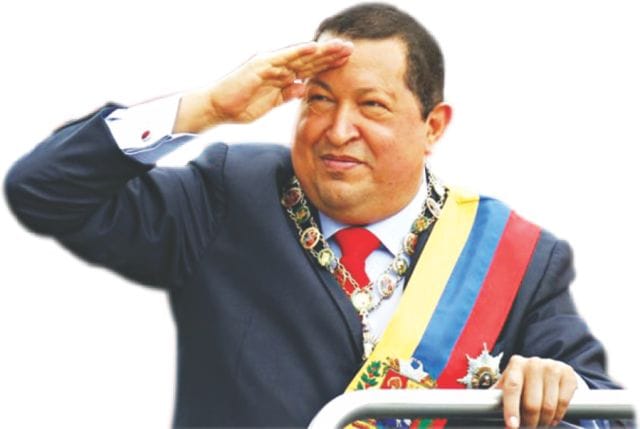Hugo Chavez passes away
Venezuelans began seven days of painful and public mourning on Tuesday night after the announcement that their president, Hugo Chavez, had died aged 58 after a long battle against cancer.
The country's vice-president, Nicolas Maduro -- tipped as a likely successor -- broke the news, prompting a wave of grief in the nation's streets.
"We have just received the most tragic and awful information. At 4.25pm, President Hugo Chávez Frias died," Maduro announced in a televised address, his voice choking. "It's a moment of deep pain," he said.
Chavez, the symbol of Latin American socialism, died at a military hospital in Caracas, the capital of the country he has ruled since 1999.
As soon as the news was announced, supporters gathered at the city's main square, Plaza Bolivar, and began chanting: "Chavez vive, la lucha sigue" – "Chavez lives, the battle continues."
People wearing the red beret the president was known for sang a popular folk song with the words: "Those who die for life cannot be called dead."
As messages of condolence came from many world leaders, perhaps the most significant was from Barack Obama. He said: "At this challenging time of President Hugo Chavez's passing, the United States reaffirms its support for the Venezuelan people and its interest in developing a constructive relationship with the Venezuelan government. As Venezuela begins a new chapter in its history, the US remains committed to policies that promote democratic principles, the rule of law and respect for human rights."
Chavez succumbed to a respiratory infection on Tuesday evening, 21 months after he first revealed he had a tumour. He had not been seen in public for three months since emergency surgery in Cuba on 11 December.
He will be given a state funeral in Caracas on Friday, likely to be attended by millions of supporters and leftwing leaders from across the globe who have been inspired by Chavez's doctrine of "Bolivarian 21st-century socialism", grateful for the subsidised energy he provided or simply impressed by his charisma. His death will also trigger a presidential election, to be held within 30 days, to decide who controls the world's greatest untapped reserves of oil.
His designated successor, Maduro, is likely to face Henrique Capriles, the losing opposition candidate in the presidential election held a few months ago in October 2012. Maduro has been declared the interim president.
Replacing one of most colourful figures on the global political landscape will be an immense challenge. Born to a poor family on the plains, Chavez became a tank commander and a devotee of South America's liberator, Simón Bolívar. A failed coup in 1992 propelled him into the limelight but it was his ballot box triumphs that made him an inspiration for the resurgent Latin American left and the most outspoken – and often humorous – critic of the US, the war in Iraq and George Bush, whom he described as a "donkey" and a "devil".
Chávez shocked his countrymen in June 2011 when he revealed that Cuban surgeons had removed a baseball-sized tumour from his pelvic region.
After that, he underwent several rounds of chemotherapy and two more operations in what he described as a "battle for health and for life". His medical records were never made public, prompting widespread speculation about his imminent demise, but he and his supporters insisted he was recovering.
Fears about his health escalated after he rushed to Cuba for hyperbaric oxygen treatment on 27 November. Less than a fortnight later, he made a televised address in which he said that doctors had discovered malignant cells that required surgery and urged Venezuelans to vote for Maduro if he was incapacitated.
Since his operation in December, Chávez has been visited by family members and several of his closest political allies, including Fidel and Raul Castro of Cuba, Ecuadorean president Rafael Correa and Bolivian president Evo Morales.
Beyond a set of four photographs released last month that showed a remarkably hearty looking Chávez smiling in a hospital bed and flanked by his daughters, the president has not been seen or heard for three months. This prompted frequent rumours that the president was dead or on life support. The government denied this and said he continued to run the country by writing down his orders.


 For all latest news, follow The Daily Star's Google News channel.
For all latest news, follow The Daily Star's Google News channel. 



Comments